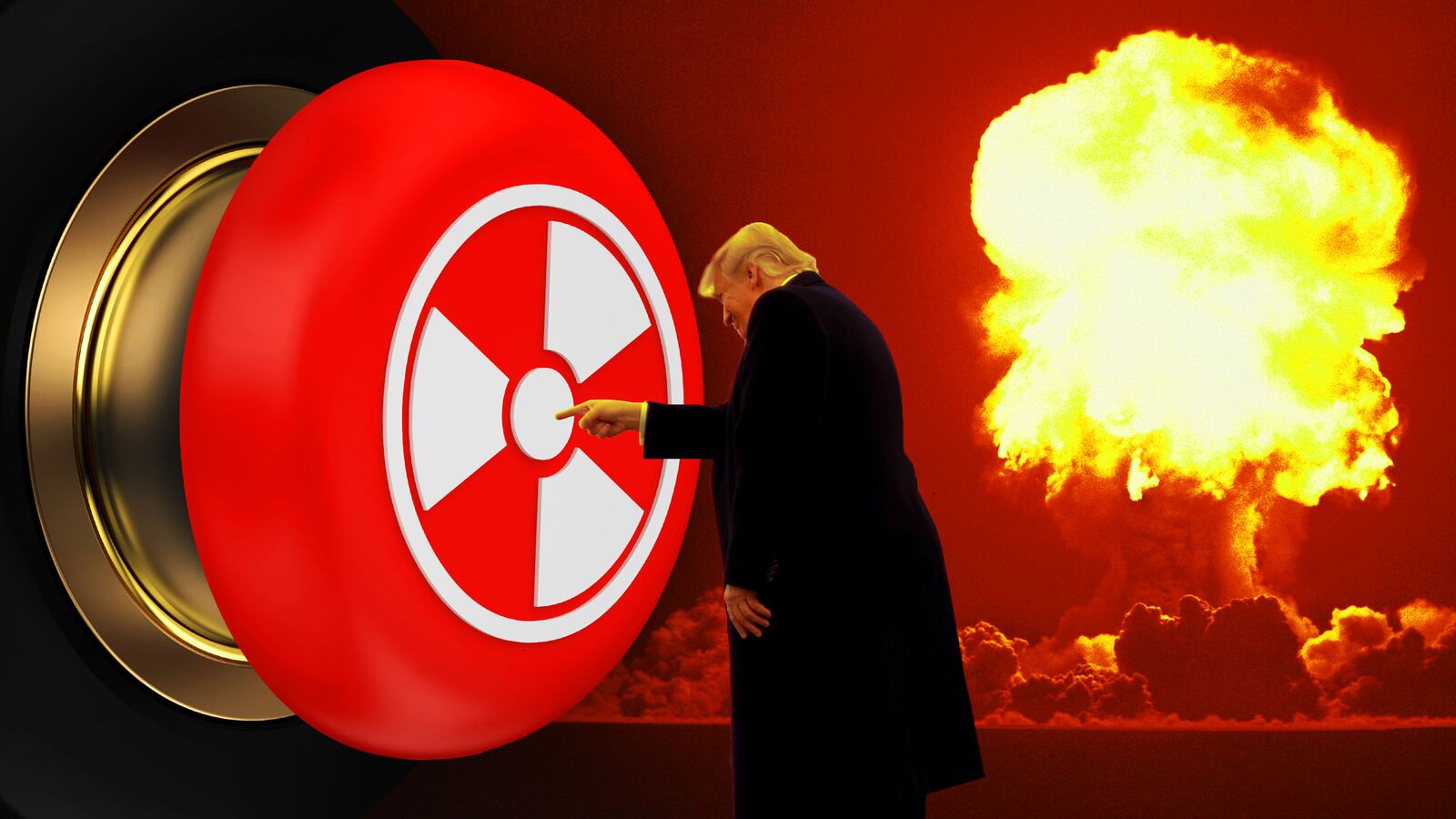This story originally appeared at Center for Public Integrity. The Center for Public Integrity is a nonprofit, nonpartisan, investigative newsroom in Washington, D.C. More of its national security work can be found here.
With rising tensions between the United States and other nations, the public overwhelmingly wants to curtail the president’s power to unilaterally order the first use of nuclear weapons, preferring instead that Congress stand between the commander-in-chief and nuclear launch orders when the country is not officially at war or under attack.
Two-thirds of the respondents to a new public opinion survey said they support pending legislation that would require Congress to declare war before the president could order a nuclear strike against another country, unless America had been attacked. Nearly six out of 10 Republicans and three-fourths of the Democrats surveyed expressed support for the legislation’s new restrictions.
More broadly, the survey showed opposition by a majority from both parties to some of President Donald Trump’s nuclear initiatives, including the planned U.S. withdrawal from a 1987 arms control accord with Russia and the administration’s inaction to extend a 2010 arms accord scheduled to expire in early 2021.
A majority also backed eventually phasing out the U.S. land-based, intercontinental ballistic missile force, now equipped with 400 nuclear warheads at three sites in the nation’s heartland—a goal at odds with the Trump administration’s plan to build new such missiles at a cost of more than $88 billion dollars.
A majority of the respondents further said that, collectively, the world’s nations with nuclear weapons have larger arsenals than they expected, and larger than they think are necessary. But more than 80 percent of all participants supported the idea that America needs to maintain a retaliatory nuclear capability powerful enough to keep other nations from finding it advantageous to attack the country.
The survey was written by the Program for Public Consultation at the University of Maryland’s School of Public Policy as a policymaking simulation focused on nuclear weapons policies in the United States, with the Center for Public Integrity as a consultant. During January and February, 2,264 participants identified by the market-research firm Nielsen-Scarborough as a representative sample of registered voters took online polls that included arguments for and against each policy choice before them. Surveyors enlisted experts with a spectrum of views to vet the explanatory materials beforehand for accuracy and to assure the strongest arguments were presented for and against each policy.
In January, Sen. Ed Markey, D-Mass., and Rep. Ted Lieu, D-Calif., introduced legislation that would abridge the president’s historically singular authority to order the use of nuclear weapons in any circumstance by granting Congress the authority to stop a president from acting first with such weapons, even against North Korea, Russia, and China. But it explicitly leaves a decision to respond to a nuclear attack from these or any other countries against the United States in the president’s hands.
So far, the bill has attracted 55 cosponsors in the House of Representatives, only one of which is a Republican, and 13 cosponsors in the Senate. Included among its supporters are at least three of the Democrats running for president – Sens. Bernie Sanders, Vt.; Elizabeth Warren, Mass.; and Kirsten Gillibrand, N.Y.
At a congressional hearing in 2017, three former officials — from the Pentagon, the White House, and the U.S. Strategic Command — spotlighted ambiguity in nuclear launch authorities and suggested that any launch that was not in response to foreign aggression amounting to an attack on the United States would constitute an act of war, and therefore would require Congressional approval. But others have challenged that legal view.
Lieu and Markey first introduced similar legislation to clarify the matter in 2016, when Barack Obama was still president. “I believed in 2016 what I still believe now: launching a weapon that has the power to instantly kill millions of people is an obvious act of war,” and should require Congressional support, Lieu said in January when he reintroduced the proposal.
The bill gathered new attention with the election of Trump, who Lieu described as “unpredictable and rash.” “We could be one tweet that insults the president away from catastrophe,” Lieu said. Markey said in a written response to questions that the new survey “confirms that the American people recognize the need for a common sense check on the president’s power to launch a nuclear first strike.”
Kingston Reif, director of disarmament and threat reduction policy at the Arms Control Association in Washington, D.C., said the survey results suggests public “unease with vesting the sole authority to order the use of nuclear weapons in the fallible hands of one person. A decision as consequential and potentially world changing as the use of nuclear weapons should not be based on the emotional state, soundness of mind, and decision-making process of one person, whether that person is Donald Trump or Barack Obama.”
Asked for comment, Defense Department spokesman Johnny Michael did not address the presidential launch authority issue. He said instead in an email that “for decades, Republican and Democratic administrations alike have recognized the critical importance of the nuclear triad for keeping the peace by deterring nuclear attack and large-scale war….We must not only continue the previous administration’s modernization program but must also pursue modest supplemental capabilities.”
Regarding the size of the U.S. nuclear arsenal, 47 percent of the respondents said the stockpile of 4,000 ready warheads and 2,200 stored warheads was larger than they expected; 12 percent said it was smaller, while 42 percent estimated it was around that size. Far more Democrats – 57 percent, compared to 34 percent of Republicans – expressed surprise that the arsenal is that size. But a world map depicting the estimated number of nuclear weapons worldwide startled Republicans and Democrats alike. In all, 56 percent said the global stockpile of nuclear weapons exceeded their expectations.
Americans’ desire to remain engaged in arms control treaties, particularly with Russia, was one of the survey’s clear messages. Collectively, 83 percent favor U.S. participation in treaties with Russia, with 80 percent or more of Democrats, Republicans and independents expressing that view.
The 2010 New START treaty, which limits the U.S. and Russia each to a specially-defined tally of 1,550 deployed strategic nuclear weapons apiece and provides for 18 inspections of each side annually to ensure compliance, is set to expire soon after the next presidential inauguration in January 2021. But so far, the Trump administration hasn’t signaled official interest in its extension and recently its officials have expressed a desire for modifications that Russia could be unlikely to embrace.
After being given a list of pros and cons, 82 percent of the respondents said that letting the treaty expire would be a mistake. They were told by the survey authors, for example, that both sides would likely build more weapons and that mutual inspections would end. But they were also told that despite complying with New START, Russia has had a poor record of adherence to other arms control accords and that allowing New START to expire would provide flexibility to expand the American arsenal if global political conditions warranted it. After weighing these arguments, 89 percent of Democrats, 77 percent of Republicans and 74 percent of Independents still said they favor extending the treaty.
Pentagon spokesman Michael responded that while “arms control can be an effective tool for managing competition and reducing risk…it is not an end unto itself, but must contribute to the security of the U.S. and its allies and partners. The U.S. remains committed to pursuing verifiable measures that effectively promote our security.”
A smaller majority from each political party endorsed trying to salvage the Intermediate-range Nuclear Forces Treaty, better known as INF, which prohibits the deployment of U.S. and Russian land-based missiles with flight ranges between 310 and 3,420 miles. In August, Trump started a process of withdrawing from the treaty by August, on the grounds that Russia had deployed a missile with a reach within the illicit range. But two-thirds of respondents said they favored staying in the INF Treaty and pursuing a diplomatic resolution of this dispute (55 percent of Republicans, 77 percent of Democrats and 63 percent of independents supported this view).
Respondents also expressed overwhelming support for America’s policy of refraining from explosive nuclear weapon tests. Overall, 87 percent said a 25-year moratorium should remain in place, including 90 percent of Democrats, 85 percent of Republicans and 83 percent of Independents.
A majority of the respondents supported phasing out America’s land-based missile force after another list of pros and cons. They were told, for example, that such missiles are vulnerable to attack and that ending their deployment would avoid spending between $120 million and $140 million. They were also told that eliminating them might signal American weakness and warned that other U.S. warheads on submarines might someday be similarly vulnerable to attack.
In the end, only a third wanted to retain and renew the missiles, while 53 percent of Republicans, 69 percent of Democrats, and 57 percent of independents supported removing them. Some favored letting the size of the arsenal simply decline, while others supported adding a comparable number of warheads to bombers and submarines once the missiles were gone.
“The lack of support for ICBMs reflects the reality that they are the least valuable leg of the triad and the large savings that would result from eliminating them,” Reif said.
A Trump initiative that collected the support of a majority of the survey respondents is the planned deployment of a warhead with a comparatively low yield – roughly half the size of the bomb that destroyed Hiroshima -- to be carried on submarines, mainly to counter Russia’s stockpile of similar bombs. A majority favored its creation, regardless of party.
Respondents weighed whether the relatively small yield of the bomb would make it more tempting to use, leading to an escalating nuclear exchange with larger weapons, or whether it would provide a more credible deterrent to a Russian attack against Europe. Republicans liked the idea best, with 77 percent supporting it, but 64 percent of Independents and 56 percent of Democrats also favored the idea.
Throughout the survey, Republicans indicated they had more of a yen for nuclear weapons than Democrats. For instance, the GOP respondents were more likely to support resuming explosive nuclear testing, withdrawing from INF, and retaining the intercontinental ballistic missile force, even though these views still attracted only a minority from the party.
“The University of Maryland survey is fascinating because it suggests Americans are more reasonable on nuclear weapons issues than our elected leaders would otherwise indicate,” said Hans Kristensen, director of the Nuclear Information Project at the Federation of American Scientists. “The overwhelming bi-partisan support for arms control and retaining treaties should be a wake-up call to the White House and Congress.”
The Center for Public Integrity is a nonprofit, nonpartisan, investigative newsroom in Washington, D.C. More of its national security work can be found here.







